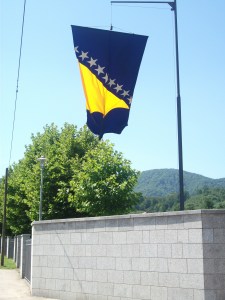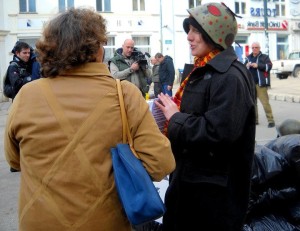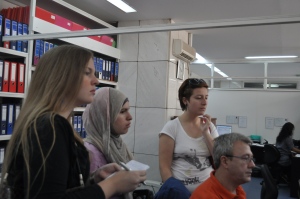Since January I and other bloggers from around the world have been writing for the Stop Street Harassment Blog. For me participating in the conversation about street harassment has been a cathartic experience, allowing me to reflect on how I deal with being harassed and how I view the men in my community who are harassing me and others. To bring Sexual Assault Awareness Month to a close, I’d like to leave you now with an overview of the past four months of the Stop Street Harassment Blog.
 In April I wrote about the clash of sexism and racism when someone is harassed by a member of a different race. Ultimately no matter how many people of any given race harass you, they are still acting alone, and it is crucial that their sexism does not fuel our racism. Rocio Andrés of Spain also explored the individualism of harassers, but delved more into their humanity than I. She reminds us that they too are products of the society that we create, so we must try to continue to view them as human. She urges that understanding street harassers is not excusing them, but it is crucial to learning how we can prevent harassment to begin with.
In April I wrote about the clash of sexism and racism when someone is harassed by a member of a different race. Ultimately no matter how many people of any given race harass you, they are still acting alone, and it is crucial that their sexism does not fuel our racism. Rocio Andrés of Spain also explored the individualism of harassers, but delved more into their humanity than I. She reminds us that they too are products of the society that we create, so we must try to continue to view them as human. She urges that understanding street harassers is not excusing them, but it is crucial to learning how we can prevent harassment to begin with.
In March I explained why self-care after being harassed is so important. Joe Samalin of New York listed TWENTY-NINE THINGS men can do to stop street harassment. 29! Katie Monroe of Philadelphia gave a shout out to HollabackPHILLY’s dance party and fundraiser put on by Get Lucid! which took place on April 5th. Also in March Rocio wrote about a missed opportunity to travel to Cairo as sexual assault and bombings stood in her way of exploring street harassment in the motherland. Pallavi Kamat of India wrote about the underlying causes of street harassment in Mumbai. Kriti Khatri of Nepal explained how street harassment can escalate to other, more severe forms of sexual violence. Brittany Oliver of Baltimore interviewed a woman in her community about street harassment and how it affects her. Joe also wrote in March how men’s silence in the face of harassment makes them allies to the harasser, not women. Brittany also wrote about Hollaback! Baltimore and their efforts to utilize local businesses to fight street harassment. And early on in March Katie explored how street harassment affects women cyclists in Philly.
 Though February is a short month a lot was written by the Stop Street Harassment Blog cohort. Kriti looked at how using public transportation contributes to women being harassed in Nepal. Rocio contrasted the realities of sexual violence in places like Rwanda and Bosnia-Herzegovina to the good things that are happening to combat street harassment in other places. She wrote about violence in war stating, “We love durings. As if there were neither after nor before.” Powerful stuff that! Pallavi highlighted some of the successful community engagement projects of Blank Noise in India. I dove into the link between street harassment and teen dating violence for Teen Dating Violence Awareness Month. Sandria Washington of Chicago challenged the idea that more crossing guards would reduce girls being harassed on their way to school. Jeanette R. of California talked about racial profiling of men as a form of street harassment. Joe explored how men can start to realize just how pervasive street harassment against women really is. February started with Andrea Ayres-Deets of San Francisco tearing open the ever-important idea that street harassment limits women’s political participation and participation in strategic nonviolent action.
Though February is a short month a lot was written by the Stop Street Harassment Blog cohort. Kriti looked at how using public transportation contributes to women being harassed in Nepal. Rocio contrasted the realities of sexual violence in places like Rwanda and Bosnia-Herzegovina to the good things that are happening to combat street harassment in other places. She wrote about violence in war stating, “We love durings. As if there were neither after nor before.” Powerful stuff that! Pallavi highlighted some of the successful community engagement projects of Blank Noise in India. I dove into the link between street harassment and teen dating violence for Teen Dating Violence Awareness Month. Sandria Washington of Chicago challenged the idea that more crossing guards would reduce girls being harassed on their way to school. Jeanette R. of California talked about racial profiling of men as a form of street harassment. Joe explored how men can start to realize just how pervasive street harassment against women really is. February started with Andrea Ayres-Deets of San Francisco tearing open the ever-important idea that street harassment limits women’s political participation and participation in strategic nonviolent action.
In January Brittany encouraged everyone from Baltimore to Cairo to Meet Us on the Streets and give voice to the harassment that overruns society. Kriti highlighted the organization Astitwa and its success in changing how Nepali police address street harassment. Katie contrasted the differences between gender-based street harassment and bicycle-based harassment. For the anniversary of Roe v. Wade I wrote about the harassment of women seeking abortions and abortion care providers as a form of street harassment. Rocio explored how things like Scotland’s “Single Woman Policy” are just band-aid solutions to the gaping wound that is sexualized gender-based violence. Finally, back at the beginning, Pallavi reminded us that the streets are not only full of harassment, but in India they are far too often where young women go to die.
I’d like to thank the Founder/Executive Director of Stop Street Harassment, Holly Kearl, for giving me this opportunity to learn and share and grow.





